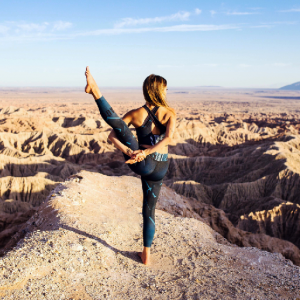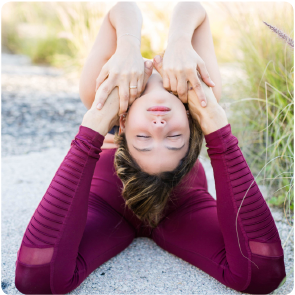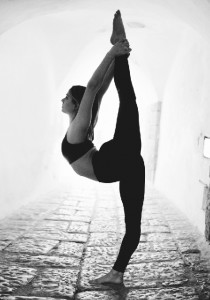Having over 234,000 followers on the social media, Talia Sutra is a modern yogi who inspires thousands of people through her yoga practice and teaching online and offline. Although she won in the USA Yoga New York Regional Competition and placed 5th in the National Yoga Asana Championship in 2013, to her Yoga is more than just a physical exercise. It’s indeed a relationship that she has been in from the day she started yoga practice.
Flexible, fierce and fearless, Talia shares with Asana Journal about her transformation, passion for yoga, as well as the message behind her quote “Love and all is coming”.
 Asana: How did you start your yoga journey? And what makes you stay on the path?
Asana: How did you start your yoga journey? And what makes you stay on the path?
Talia: I think most journeys start when we allow the old ones to come to end.
I was 21 years old: I had dropped out of the fine arts department at the School of Visual Arts in NYC and soon after ended a significant four year relationship.
At the time I was also passively pursuing acting. I spent most of my childhood and adolescence religiously studying classical ballet and so performance had always been (and still is) deeply meaningful to me.
I remember an almost constant juggling of relief, hope, confusion and worry.
I wasn’t sure what would come next. I wanted to continue painting and acting…I would sit in cafes and sketch and write…occasionally I would collaborate on a short film, I also had a part time job at American Apparel.
But something was missing: I started realizing that I was cyclically avoiding myself. Looking back, I know that I was desperate to fill the void with my natural gift for characters, personas and costumes.
My mom started practicing yoga around the time I was six. Although I grew up with knowledge of the practice, I yawned through most of these yoga classes; the postures seemed crude to my ballet focused mind.
I do remember a particular yoga group in Great Neck, NY which I felt connected to. They had a tiny house across from the ballet school where I studied and after my evening ballet classes, I would cross the road and enter the candle-lit, incensed room. My mom would be in savasana on the floor and I would join, lying on my back and closing my eyes. The teacher would guide us in meditation deep into a white cave where we would float weightlessly…the sessions would end with tea and stories.
We moved from Great Neck to Manhattan when I was 15, my dance training intensified and I eventually stopped thinking about the yogis.
I’m not sure how, but years later, I found myself at Yoga to the People, a donation based studio on the Lower East Side in NY.
I was pretty much hooked from my first class, I started practicing twice a day, reading books by Paramahansa Yogananda and Iyengar and hungrily researching the web for yogic information.
The teachers, all (fascinating) women around my age, encouraged me to take part in the next teacher training. And so, I took their advice and soon was a teacher in training.
Immediately following my graduation, I began an apprenticeship with YTTP and some months after, my prayers and efforts were answered and I became a full time yoga teacher, teaching up to five classes a day. Yoga teacher training never ends…every class gave me a wealth of experience, every practice deepened my connection and I continued praying for the honor of igniting as many people as possible with a love for yoga.
I myself, have a relationship with yoga. I love it and care for it and I know that “it” cares for me and loves me back. I stay on the path because the path stays with me.
 Asana: How do you describe your yoga practice? Between physical and spiritual, which one weighs more in your practice?
Asana: How do you describe your yoga practice? Between physical and spiritual, which one weighs more in your practice?
Talia: Like I said, I’ve been in a relationship with my yoga practice. Like any relationship, it has its ups and downs but I believe that when I keep my practice, it too, keeps me.
Throughout the years, I (and therefore my yoga) have Bouncy Castle matured and transformed and continue to do so daily.
The first five years of my yoga practice were highly physically demanding. I taught a minimum of three classes a day seven days a week and used any free time I had for my own practice and self education.
In the past couple of years, I have shifted into a much lighter teaching schedule (about five classes a week) as well as a lighter home-based asana practice.
I do not see the physical as being separated from the “spiritual”. My asana practice is a form of prayer, always was and God-willing, always will be.
Asana: Did you ever think that it would become your career and how did it change your life?
Talia: I had many different thoughts…during my TT, I experienced thoughts of both doubt and hope about yoga. In my heart, I wanted nothing more than to devote myself to yoga, but of course, there were times when my mind would respond to difficulties with nagging thoughts and scenarios of failure.
My desire for yoga was insatiable though: I think when we love anything very deeply, it fills us with faith which transcends the rational. In other words, I had faith that I would succeed but I had no clue how.
Yoga changed my life and continues to change it in many ways. If I had to get to the bottom line, I would say, it gave me what I wanted more than anything: purpose and meaning.
Asana: What’s the difference between being a student and a teacher in your personal experience? Do you think your practice has evolved over the years?
Talia: Teaching and Learning go hand in hand. It is impossible to do one without the other. An excellent teacher is simply an excellent student.
In order to teach, I must be genuinely inspired and able to renew my connection and relationship with yoga. Of course my practice has evolved, it is very much alive and changes day to day.
Asana: Have you ever encountered any challenge in your practice and teaching?
Talia: In my experience, challenge is always present as the counterpart force or even the “parent” of our greatest gifts and talents.
To give a superficial example: I look younger than I am, especially in person and my asanas differ than the norm in their depth- therefore others’ perceptions of me have sometimes been a challenge. People who have never met me, spoken to me or taken my class have formed opinions based on my physicality alone. But this of course is to be expected considering the nature of my work and visibility.
Challenge is good as long as we take its cues with a few pinches of salt. It definitely has strengthened my character and resolve.
Asana: Can you tell us more about your motto Love and all is coming? How do you apply this in your teaching?
Talia: Love is the desire to connect.
Having true desire to connect ourselves with Ourselves, with another or with the divine sets us on a trying, confusing and transformative path on which many things are revealed as they come to us, or perhaps as we come to them.
 Love and all is Coming can be understood intuitively by the heart.
Love and all is Coming can be understood intuitively by the heart.
Still, the word love has so many meanings and forms and can easily be confused as the goal. I see it as more of a PROCESS.
In the process of love, I am silent enough to listen to a subtle sound or to witness the ordinary as the magical. It’s also scary at times, like an endless dive…
In this process, I see that the external self (ego), like the external world (reality), is continuously built and rebuilt with our will.
There are times when it is hard to find the process of love in these consuming external realties because they become static when comfortable and love requires growth! Growth leads to transformation, transformation then insists on continuous renewal.
When we cultivate a desire to connect we must then renew it every single day.
In other words, Love is a daily practice.
Asana: You have recently launched your online yoga classes, what do you think about teaching in a digital world?
Talia: I think it’s wonderful and amazing…I loved working with CodyApp on my Love and All is Coming series! Thousands of people worldwide can now take my classes. It is a dream come true.
Asana: You travel around to conduct workshops and trainings, do you find any difference in yoga practice in various countries?
Talia: I’m very grateful for the ability to travel and experience the beautiful diversity of the world. There is a sort of outer layer of sameness- yoga studios and yoga students look pretty similar worldwide: they wear the same brands and listen to similar music and sip on tea and coconut water. Of course, when I look past the superficial, my feeling is that each country, each people have their own unique spirit and I hope that this diversity continues to thrive despite this age of globalization and instant information…
Sometimes I think we confuse the concept of Oneness with sameness. Oneness gains meaning and purpose only through the acknowledgment in both mind and heart that we are in fact different- and for good reason! Each nation serves a unique purpose and no two souls are alike, but we all, in our own ways, serve a single inconceivable whole .
Asana: “Yoga Selfie” (posting yoga photos and videos on social media) has become a trend, as one of the most popular InstaYogis, how do you see it?
Talia: All yoga is good yoga. Yoga spreading to popular culture is a great sign of the beginning of massive, worldwide shift in consciousness.Yoga selfies are a fun way to stay motivated and connected with other yogis. Also, they may (and do!) eventually trigger a deeper connection to the practice and its community.
Asana: What are the messages you would like to send out in your photos on social media?
Talia: They say a picture is worth a thousand words…Before the evolution to written words, people communicated their ideas through drawings and symbols. I think visual communication is extremely powerful in the way it breaks through the language barrier.
As an artist, I appreciate the process of creating a beautifully lit , well composed photo and I really enjoy selecting and curating my feed. Besides the visuals, I also communicate my daily thoughts and meditations through my written captions. Together the image and caption send a message which hopefully provokes the mind and heart to awaken and serve with joy.
Asana: How did you manage to stay in a yogic lifestyle while living in a busy city like New York?
Talia: I never had to manage…My practice was cultivated and thrived in the madness of NYC! I absolutely love New York because it has a piece of every corner of the world inside it, it is very rich in its diversity, challenges and offerings. Clearly, I don’t think yogic lifestyles are limited to sandy beaches or peaceful country sides as I now live in Jerusalem- another one of a kind city.
Asana: What is your typical day other than teaching yoga? What do you pack in your bag?
Talia: Well, I not only moved to Jerusalem a month ago, I also got engaged…so the days have not been too typical!
In the midst of furnishing a little apartment, meeting his family and starting to plan a wedding, I have also developed a deeper meditation and prayer practice.
I’ve been studying Torah, Kabbalah and Chasidot with Ezra (my fiancé) which has connects me with my roots and inspires my writing and teaching.
My bag is usually packed with my computer, phone, chargers, notebooks, books, pens, an array of lip balms, essential oils and my mala.
Asana: Having moved back to Israel just recently, what are your upcoming plans and projects?
Talia: Right now I am in a sort of observation phase. I’ve slowed down my teaching schedule so that I can properly focus and learn more about my environment.
I am spending a lot of time on my own meditation, focus and devotion practice and doing my best to then make them accessible to all people.
There is one upcoming project I am excited to be a part of: an all-day wellness festival for International Women’s Day in Tel Aviv aimed at bringing women of all backgrounds and faiths together for a day of music, dance, yoga and mediation.
I’m also very interested in learning to cook and bake!
Asana: What would you do if you didn’t choose the path of yoga?
Talia: I would probably be more involved in the arts, maybe as a painter or director.
To read the full article please download our Asana Journal App or purchase Issue 157 January 2016.




















 Other
Other
Hellow my name is Martinwat. Wery good art! Thx 🙂